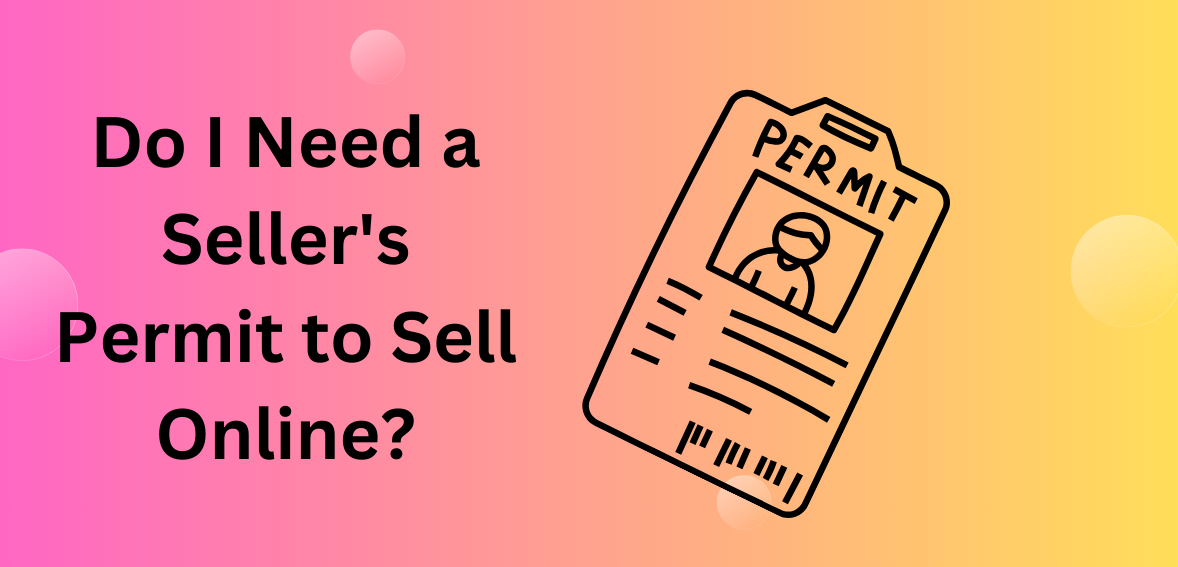Welcome to the world of online selling! Whether you’re a seasoned entrepreneur or just starting out on your e-commerce journey, one question that often arises is whether you need a seller’s permit to sell online. Well, let’s clear the air and dive into this topic headfirst.
Picture this: you have an amazing product ready to launch, a beautifully designed website, and a marketing strategy that would make even the savviest marketer proud. But before you hit that “sell” button, there’s one crucial thing you need to consider – obtaining a seller’s permit.
In this blog post, we’ll unravel the mystery behind seller’s permits for online sellers. We’ll explore what exactly they are and who needs them. Plus, we’ll delve into the benefits of having one for your online business. So grab your favorite beverage and get ready for some valuable insights! Let’s get started!
What is a Seller’s Permit and Who Needs One?
A Seller’s Permit is a legal document that allows an individual or business to sell goods or services and collect sales tax from customers. It is issued by the state government and is necessary for anyone selling tangible products, both online and offline. So, who needs one?
If you are running an online business and conducting sales transactions, chances are you need a Seller’s Permit. This applies whether you have your website or are using third-party platforms like Amazon or Etsy. Regardless of where you’re selling from, if you meet certain criteria – such as exceeding a certain threshold in annual sales revenue – obtaining a Seller’s Permit becomes mandatory.
The purpose of a Seller’s Permit is to ensure that businesses comply with tax laws by collecting and remitting the appropriate amount of sales tax to their respective state governments. Each state has its own rules regarding when a permit must be obtained, but it typically involves registering with the state’s taxation department and providing relevant information about your business.
Obtaining a Seller’s Permit may seem like extra paperwork, but it comes with several benefits. For one, having this permit legitimizes your business in the eyes of potential customers. It also allows you to purchase products at wholesale prices without paying sales tax on those items.
Additionally, having a Seller’s Permit enables easier record-keeping for tax purposes since all taxable transactions must be properly documented and reported according to regulations set forth by each state government.
To obtain a Seller’s Permit, start by researching your specific state requirements through their official websites or contacting their taxation departments directly. Generally speaking though, expect to provide details about your business structure (sole proprietorship, LLC), estimated annual revenue projections, product categories sold online (if applicable), and personal identifying information.
It’s important not to overlook compliance with tax laws as an online seller – ignorance does not excuse non-compliance! Remember that failing to obtain proper permits can result in penalties including fines or even criminal charges. So, take the time to understand your obligations and ensure that you are properly
Benefits of Having a Seller’s Permit for Online Sales
Having a seller’s permit is essential for online sellers, as it offers numerous benefits. With a seller’s permit, you can operate your online business legally and avoid any potential legal issues or penalties. It gives you the authority to collect sales tax from your customers and ensures that you are in compliance with tax laws.
Having a seller’s permit can enhance your credibility as an online seller. Customers are more likely to trust and purchase from businesses that have all the necessary permits and licenses. It adds legitimacy to your operations and sets you apart from unregistered or unauthorized sellers.
Additionally, obtaining a seller’s permit enables you to access certain privileges. For instance, some wholesalers require proof of a valid seller’s permit before allowing retailers to purchase products at wholesale prices. This can help lower your costs and increase profitability.
Moreover, having a seller’s permit allows you to participate in events such as trade shows or craft fairs where vendors may be required to provide their permits for participation eligibility. These events offer valuable opportunities for networking, showcasing your products/services, and reaching new customers.
Furthermore, possessing a seller’s permit makes it easier for accounting purposes since reporting sales tax becomes straightforward. You will have accurate records of taxable transactions which simplifies filing taxes during tax season.
In conclusion, obtaining a seller’s permit provides several advantages including legal compliance, credibility, access to wholesale pricing, participation in events, and simplified accounting processes.
How to Obtain a Seller’s Permit
Obtaining a seller’s permit is an important step for anyone looking to sell products or services online. The process can vary depending on your location, but here are some general steps to help you get started.
First, research the requirements in your specific jurisdiction. Each state or country may have different rules and regulations when it comes to obtaining a seller’s permit. Make sure you understand what is required of you before proceeding.
Next, gather all necessary documentation. This may include proof of identity, such as a driver’s license or passport, as well as any business registration documents if applicable.
Once you have all the required paperwork in order, you will need to complete an application form. This can typically be done online or submitted by mail. Be prepared to provide detailed information about your business and its activities.
After submitting your application, there may be a waiting period while it is reviewed and processed. It’s important to be patient during this time and follow up if necessary.
If approved, you will receive your seller’s permit either electronically or through the mail. Keep this document in a safe place as it may need to be displayed or provided upon request.
Remember that obtaining a seller’s permit is just one part of being compliant with tax laws as an online seller. It’s also crucial to keep accurate records of your sales and report them appropriately come tax season.
By taking the time to understand and obtain a seller’s permit for online sales, you are not only fulfilling legal requirements but also protecting yourself and your business from potential penalties or issues down the line
Common Misconceptions about Seller’s Permits for Online Sellers
When it comes to selling online, there are several misconceptions surrounding the need for a seller’s permit. Let’s debunk these common myths and shed some light on the truth.
Misconception #1: “I only sell a few items online, so I don’t need a seller’s permit.”
The truth is that regardless of the quantity or frequency of your sales, if you are conducting business as an online seller, you likely need a seller’s permit. It doesn’t matter if you’re selling items from your basement or operating on a large scale – complying with tax laws is essential.
Misconception #2: “I don’t have to worry about taxes because I’m just selling second-hand items.”
While it may be true that some jurisdictions exempt certain types of goods from sales tax, this does not absolve sellers from obtaining a seller’s permit. Even if you primarily deal in used products, there might still be applicable taxes or reporting requirements.
Misconception #3: “I can avoid getting caught without a seller’s permit since I’m an online-only business.”
Operating solely online does not grant immunity from legal obligations. Tax authorities have become increasingly vigilant in monitoring e-commerce activities and identifying businesses that fail to comply with regulations. The consequences of non-compliance can range from monetary penalties to legal repercussions.
Misconception #4: “Obtaining a seller’s permit is complicated and time-consuming.”
While navigating through government bureaucracy may seem daunting at first, obtaining a seller’s permit is typically straightforward and relatively quick. Many states offer convenient online application processes with clear instructions to guide sellers through the necessary steps.
It is crucial for all online sellers to understand their responsibilities when it comes to taxes and compliance. By dispelling these misconceptions surrounding seller’s permits, we hope more individuals will take proactive measures toward ensuring lawful operations in their e-commerce ventures. Remember, it is always better to be informed and prepared than to face the
Tips for Complying with Tax Laws as an Online Seller
As an online seller, it’s crucial to understand and comply with tax laws to avoid any legal issues or penalties. Here are some tips to help you navigate the world of taxes as an online entrepreneur.
Keep detailed records of all your sales and expenses. This includes invoices, receipts, shipping costs, and any other relevant documents. It will make your life easier when it comes time to file your taxes.
Familiarize yourself with the specific tax obligations in your jurisdiction. Each country or state may have different rules regarding sales tax, income tax, and reporting requirements for online sellers. Stay updated on any changes in legislation that may affect you.
Consider consulting a professional accountant or tax advisor who specializes in e-commerce businesses. They can provide valuable guidance tailored to your specific situation and ensure that you’re meeting all your tax obligations correctly.
Additionally, be aware of any potential exemptions or deductions available to you as an online seller. Some jurisdictions offer special allowances for home-based businesses or certain types of products/services sold online.
Lastly but most importantly: don’t procrastinate! Make sure you set aside time regularly throughout the year to review your financials and prepare for tax season well in advance. This will help prevent last-minute stress and errors when filing returns.
Remember that complying with tax laws is not only necessary but also a responsibility as a business owner. By staying informed and organized when it comes to taxes, you can focus more on growing your online business without worrying about potential legal consequences down the line.
Conclusion: The Importance of Understanding and Obtaining a Seller’s Permit for Online Sales
In today’s digital age, selling products online has become a popular way for individuals and businesses to reach customers around the world. However, amidst all the excitement of starting an online business, it is crucial not to overlook the legal requirements that come with it. One such requirement is obtaining a seller’s permit.
A seller’s permit is essentially a license that allows you to sell goods or services within a specific jurisdiction and collect sales tax from your customers. It acts as proof that you are registered with the appropriate tax authorities and are complying with their regulations.
Whether you’re selling handmade crafts on Etsy, running an e-commerce store on Shopify, or even just occasionally selling items through online marketplaces like eBay or Amazon, obtaining a seller’s permit should be on your radar.
Having a seller’s permit offers several benefits for online sellers. It ensures compliance with tax laws by enabling you to collect and remit sales taxes correctly. This helps avoid any potential penalties or legal issues down the line.
Additionally, having a valid seller’s permit can also boost your credibility as an online seller. Customers often feel more confident purchasing from sellers who have taken the necessary steps to operate legally and transparently.
Obtaining a seller’s permit may vary depending on your location since different states and countries have different requirements when it comes to collecting sales tax from online transactions. To get started, research which local agencies handle sales tax registration in your area and follow their application process.
It is important not to fall into common misconceptions about whether or not you need a seller’s permit for your online business. Some people mistakenly believe that if they only sell occasionally or make small profits, they don’t need one. However, most jurisdictions require sellers – regardless of size – to obtain proper permits if they engage in taxable transactions.



























